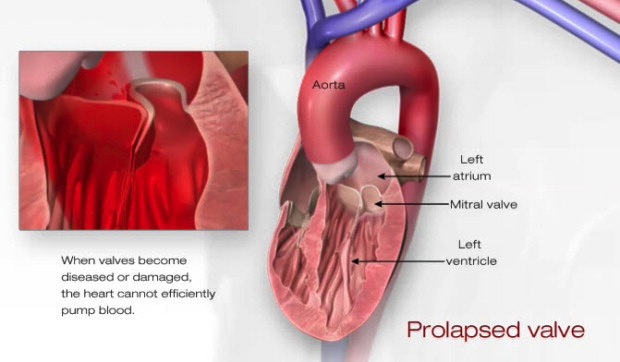
Mitral valve prolapse is a condition in which the two valve flaps of the mitral valve do not close smoothly or evenly. Mitral valve prolapse is also known as click-murmur syndrome, Barlow’s syndrome or floppy valve syndrome.
What happens during MVP?
When the heart pumps (contracts) part of one or both flaps collapse backward into the left atrium. In some cases, the prolapsed valve lets a small amount of blood leak backward through the valve, which may cause a heart murmur.
Is mitral valve prolapse dangerous?
In most cases, it’s harmless. Most people who have the condition are unaware of it and their health is not affected. However, in some cases treatment is required.
What causes MVP?
The most common cause of MVP is due to small, usually harmless, tumor-like growths of collagen on the valve leaflets (called myxomatous changes). Mitral valve prolapse occurs in 2 percent to 3 percent of the population. A person can be born with the genetic risk of developing MVP or it can be caused by other health problems, such as some connective tissue diseases.
How is mitral valve prolapse detected?
Because most patients with MVP do not experience symptoms, a murmur may be detected during a routine physical examination when a healthcare provider uses a stethoscope to listen to the heart.
What should I do if a murmur is detected?
Even for those who are not experiencing symptoms, if a murmur is detected with an accompanying mitral valve prolapse, it is recommended that you undergo an echocardiogram, or echo. The echo uses ultrasound to evaluate the characteristics of the valve cusps and how much blood may be leaking (regurgitation) from the valve when the heart contracts. The test results and extent of your symptoms will guide your healthcare provider in determining if further testing and prescribed medications are indicated.
What is “mitral valve syndrome” and what are its symptoms?
Mitral valve syndrome is the term for the condition experienced by the small number of people who have symptomatic MVP.
Symptoms, which in some cases may be related to leaking of the mitral valve, can include:
- Chest pain (not caused by coronary artery disease or a heart attack)
- Dizziness
- Fatigue
- Sensation of feeling the heart beat (palpitations)
- Shortness of breath with activity or when lying flat (orthopnea)
Does mitral valve prolapse need to be treated?
In many instances, having MVP will not impact your health and requires no treatment. Talk with your healthcare provider about how best to prevent complications from MVP based on your level of risk. If you are prescribed medication, take it as directed.
People with an abnormal mitral valve may need mitral valve repair or replacement if:
- Symptoms are getting worse
- The left ventricle of the heart is enlarged
- The heart function gets worse
MVP very rarely becomes a highly serious condition. However, in the most serious cases, mitral valve prolapse can cause abnormal heartbeats (arrhythmias) that may eventually become life-threatening.
When valve prolapse is severe enough to cause significant valve leakage, it can lead to serious complications like stroke. This happens because a mitral valve leaking (regurgitating) a significant amount of blood can cause blood clots to form. When clots travel from the heart to the arteries or the brain, it can lead to a stroke or heart attack.
Content Resource: http://www.heart.org/HEARTORG/Conditions/More/HeartValveProblemsandDisease/Problem-Mitral-Valve-Prolapse_UCM_450441_Article.jsp

